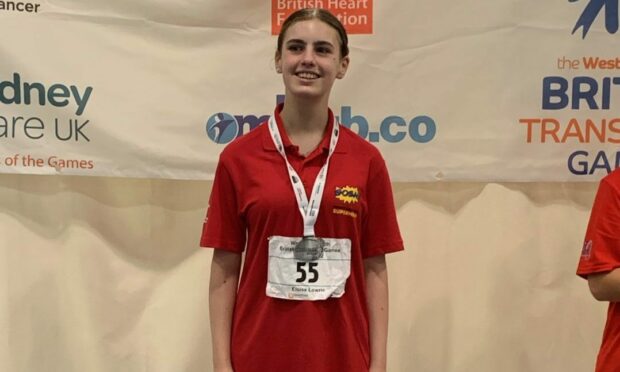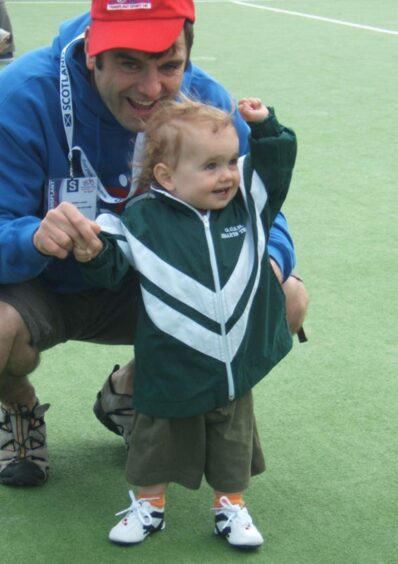A north-east teenager who received a heart transplant just after her first birthday has qualified for a global sports event – and is using her success to spread awareness of the need for child organ donors.
Rothienorman’s Eloise Lowrie, 17, won badminton gold and table tennis silver at the British Transplant Games earlier this year, and will now make her World Transplant Games debut in Perth, Australia, next April.
Sports mad Eloise was born with hypoplastic left heart syndrome, a condition where the left side of the heart doesn’t grow and the organ is therefore unable to pump enough blood and oxygen to the lungs.
She would have died within a week of being born were it not for an initial operation to “re-plumb” her cardiovascular system 24 hours after her arrival, before going under the knife again at only six months old.
However, despite hopes these early operations would see Eloise through school and perhaps even into her 20s before a heart transplant was eventually required, the transplant was needed much sooner.
Heart failure to heart transplant to running in just a few months
As Eloise’s mother Sarah explained tearfully: “Unfortunately she developed a clot in the heart muscle itself, which stopped the heart from pumping, and she was in heart failure from about the age of eight months.
“That required her being put on the transplant list when she was just over a year old.
“She was really fortunate – we lived in the Evelina Children’s Hospital at St Thomas’ in London for about seven weeks, then we got our call and she was taken over to Great Ormond Street, because, although her heart condition had to be treated in one specialist hospital, they (Evelina) weren’t specialists for transplants. There are only two paediatric hospitals specialising in heart transplants in the UK.
“She received her new heart and within 24 hours, when we went in to see her, it was the first time we’d ever seen her with pink hands and feet instead of blue hands and feet. It was amazing to see that.
“When they woke her up, it was like someone had changed her batteries. She’d gone from being a baby who would just sit and watch things moving around her, who could barely eat – it would take an hour to feed her a small yoghurt – to waving her arms, smiling. And within a couple of days she was wolfing down big bowls of Weetabix and eating like there had never been an issue.”
Within 10 days of her transplant, Eloise was released to Sarah’s parents’ house in Surrey and her rapid progress, aided by her new, functioning heart, continued as she quickly learned to walk.
Her first “competitive run” followed soon after – an early indicator of her devotion to sport.
Sarah said: “She competed in her first (British) Transplant Games at 18 months old that summer with a little bit of help – competing in the 10m run alongside (Children in Need mascot) Pudsey, who would assist Eloise in her first couple of Transplant Games.
“She’s been going pretty much every year since.”
Warming up and cooling down the biggest hurdle for transplantees
Despite her heart transplant, Eloise has grown into a very active, fit young adult, combining sports like badminton and table tennis – which she will soon compete in on the world stage – with dancing seven times a week.
Although cardio-based activity can be more difficult and she admits to sometimes pushing herself “too much”, Eloise says concerns over her heart do not cross her mind when she is exercising
She is targeting World Transplant Games gold in badminton and table tennis next year – adding: “It unrealistic, but being unrealistic – gold in everything. That’s what I’m hoping for.
“I don’t aim for anything less.”
Sarah explained how the biggest difference heart transplantees face in sport is around warming up and cooling down at the start and end of exercise.
She said: “Because all of the nerves are cut between the brain and the heart, she doesn’t have the immediate nerve connection to the heart which automatically speeds your heart rate up when you’re about to do exercise.
“She has to wait for the adrenaline to get round her system to get the heart rate going and to pump enough blood round her body to feed her muscles with oxygen.
“If she just goes straight into a series of jumps in ballet, she’ll be breathless quite quickly.”
Donor family ‘gave us our daughter back in moment they lost their child’
By publicising Eloise’s qualification for the World Transplant Games, the Lowries, including dad Andy and Eloise’s siblings, hope to raise awareness of the need for more organ donors – including child and baby donors.
Despite the success of her transplant, Eloise will need to have her donor heart replaced at some point in the future, but she would not be alive today were it not for the “incredible” actions of her initial donor family 16 years ago.
Sarah said: “There’s a particular shortage of baby and children’s donors.
“The worst thing possible does happen to children and babies, which is so hard to think about, but having that conversation about what you would do if the worst was to happen to yourself or your children, before it happens, is a big thing.”
Sarah admitted even she found it “very difficult” to say yes to organ donation on the form for her subsequent children when they were born, adding: “I did, but it was a very emotional decision to make – but they are needed.
“There are hundreds of children on the transplant waiting list and too many of them die because there aren’t organs available.
“The sad loss of a child at that age is the worst thing that can happen, and choosing to donate at that moment is an incredible thing to do.
“We can never say thank you enough to our donor family. They’ve given us our daughter back, and when they lost their child.”
The Lowrie family have to pay for Eloise and her accompanying adult to travel to the World Transplant Games – which they estimate will cost £6,000.
You can sponsor Eloise here.
Any money raised goes directly to the Transplant Sport charity, which Eloise can then access for direct Games-related costs only. Any extra money raised will go to Transplant Sport.



Conversation